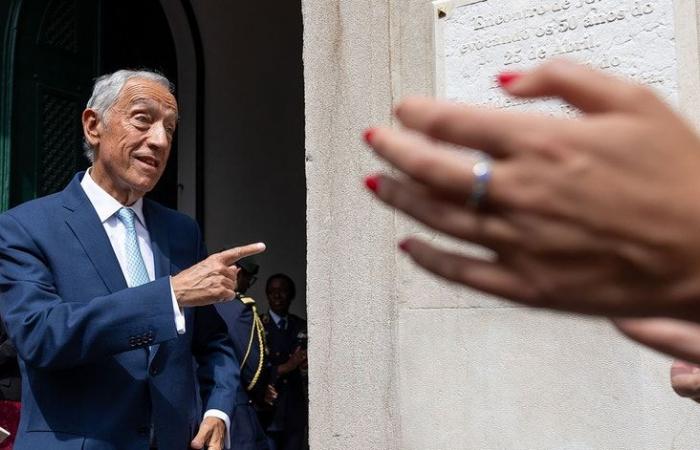
In recent decades, Portugal has failed to end poverty, even though it is not at the level of “other times”. Marcelo Rebelo de Sousa considers that a “hard core” of poverty has remained in society, currently affecting nearly two million Portuguese people.
This is the main failure that the President of the Republic points out when asked about the last 50 years, even though it is a different poverty to that which existed previously. The head of state also mentions the aging of the Portuguese population.
In the interview with António José Teixeira, recorded at the Palácio de Belém last Tuesday, Marcelo Rebelo de Sousa recalled how he lived the days of the revolution. At the time, as a journalist for Expresso, he felt the effects of censorship and joined groups that “conspired for democracy, decolonization and integration in Europe”, also including SEDES.
At a family level, he recalls that at the time, people lived with “the family relationship that was possible when they were on different sides”. Baltazar Rebelo de Sousa, father of the President of the Republic, was at the time Minister of the Colonies under Marcelo Caetano.
Marcelo recalls that, just a few days before the 25th of April, his father was already aware of the wear and tear of the regime. When they took a family photo on April 16, the president’s father already saw himself as “past”.
The head of state, a journalist at the time, also had this notion. “I didn’t sense it, I knew it”, he said in this interview, recalling the contacts he had with General Spínola. Everything was just a matter of “setting dates” and paying attention to what would happen “more week less week”.
On the regime’s side, the information was “null”. “He knew there was a movement, he didn’t control the movement, but the political police themselves didn’t have the idea”, something he attributes to the “talent of the Captains Movement” and the “breadth of connections and organization”.
On April 25th, there was the organization of the military but also the “popular support”, highlighted Marcelo.
“Implementing a democracy takes time”
Marcelo Rebelo de Sousa, in this interview, gave a positive assessment of the 50th anniversary of the Revolution. He considered that “freedom” and “democracy” were the main achievements of April, largely due to the emancipation they brought.
Regarding the future, the President of the Republic considered that a “democratic and free society is dynamic, therefore changing”.
Despite persistent poverty, Marcelo Rebelo de Sousa argued that the country “has changed a lot” in 50 years, but that “implementing a democracy takes time”.
In recent decades, Portugal has rapidly undergone several transformations. “We did everything at the same time, we ended a five-century-old empire, we ended a 50-year dictatorship, we created a state with freedom and democracy”, with several economic changes and rapid integration into Europe, particularly with integration into the Euro Zone.
“In 12 years we took the path that great economies took in 40”, he highlighted.
He highlighted, as a positive, the “global judgment” of the Portuguese who continue to consider that the 25th of April “was worth it”, even though they disagree with “a thousand things”.
With an “overwhelmingly favorable” opinion to April’s ideals, Marcelo Rebelo de Sousa recognized that this is an “imperfect and unfinished” work, with the world “changing a lot” and today’s challenges “are completely different”.
“The task of younger people is to be dissatisfied, to want much more and much better”, said Marcelo Rebelo de Sousa about the younger generations.
Tags: RTP Interview Marcelo persistence poverty society biggest failure years
--




